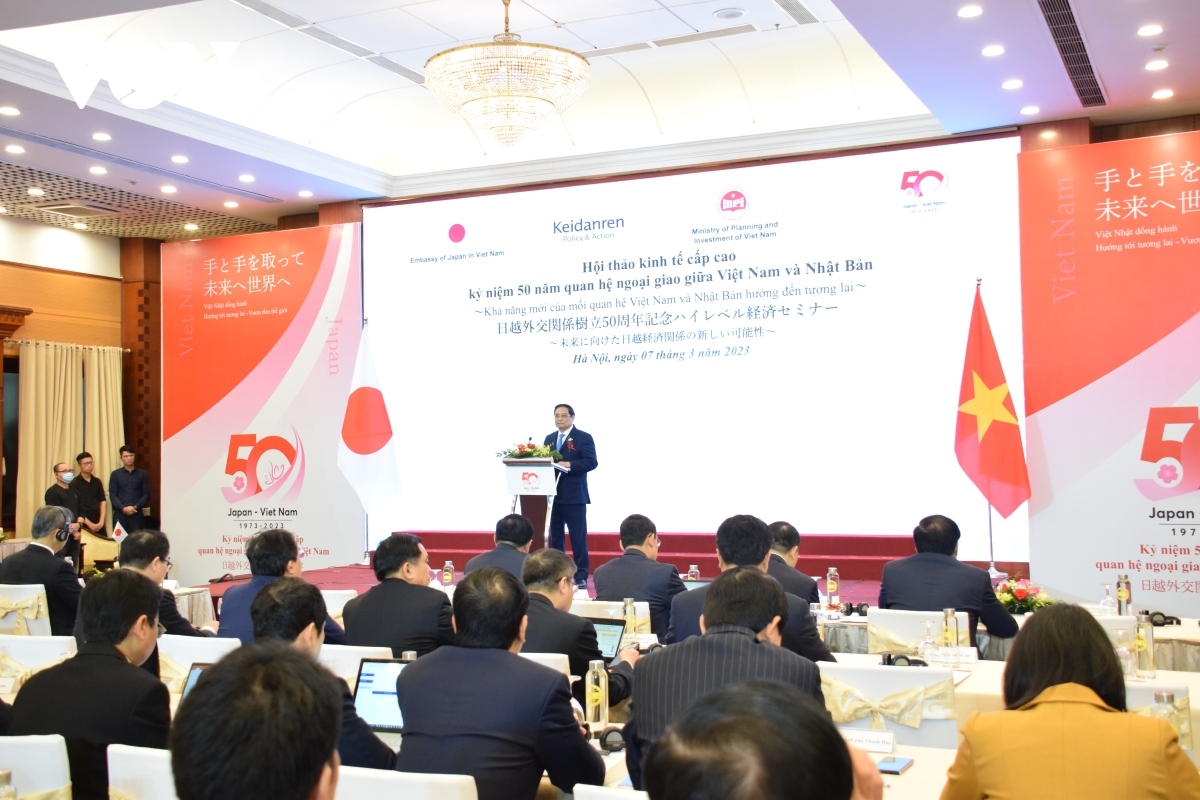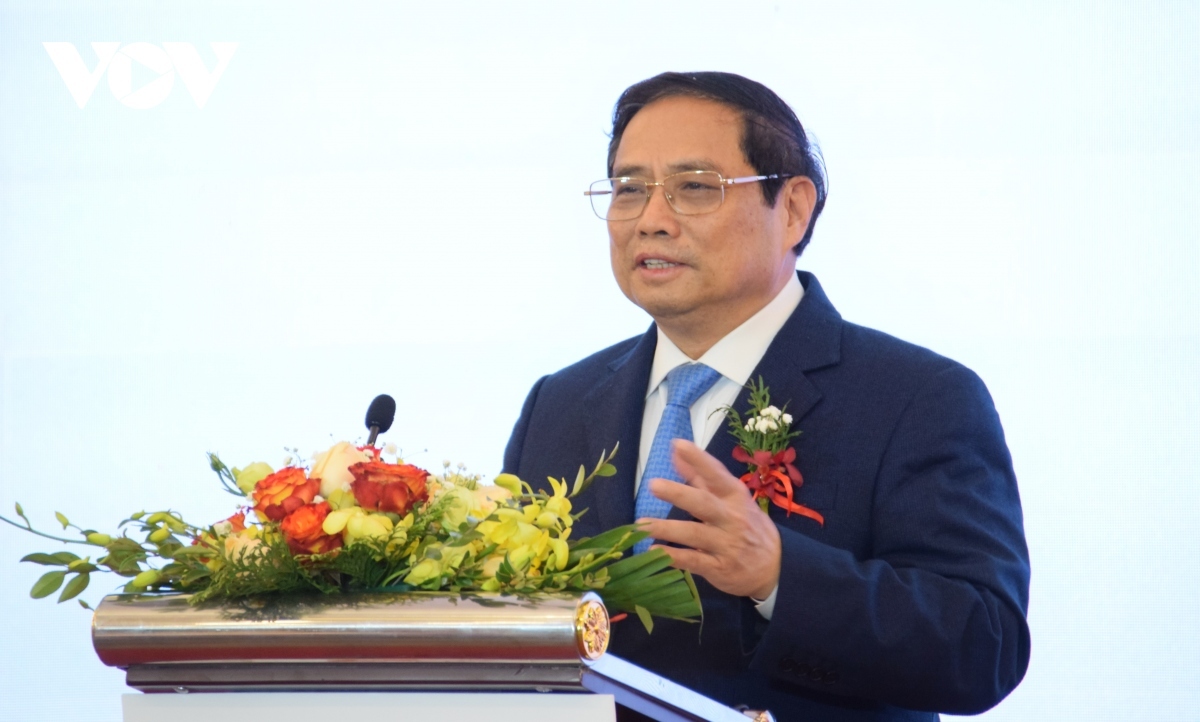Vietnam, Japan seek to achieve stronger economic links
VOV.VN - Prime Minister Pham Minh Chinh attended a high-level economic seminar on March 7 in Hanoi as part of activities held to mark the 50th anniversary of Vietnam- Japan diplomacy.

The event was co-organised by the Ministry of Planning and Investment, the Embassy of Japan, and the Japan Business Federation, with the seminar connecting online to thousands of businesses across Japan.
50 years ago, on September 21, 1973, both sides officially established diplomatic ties. Since then, through many ups and downs occurring both worldwide and throughout the region, the friendship and co-operation between the two nations have been continuously consolidated and developed across a multitude of fields.
Political and diplomatic relations, as well as co-operation in security and defence, has been increasingly strengthened in a substantive manner, while cultural activities and people-to-people exchanges have become an important foundation for the increasingly close and trusting relationship.
In particular, ties in economics, trade, and investment have been comprehensively promoted, with the two sides building important legal frameworks specifically for bilateral relations.
Simultaneously, both nations are members of new-generation free trade agreements such as the Comprehensive and Progressive Agreement for Trans-Pacific Partnership (CPTPP) and the Regional Comprehensive Economic Partnership (RCEP).
These represent important corridors to promote trade and investment relations between the two nations in the spirit of mutual benefit and complementarity.
Regarding official development assistance (ODA), after more than 30 years Japan has become the leading ODA donor country of Vietnam, with over 2.7 trillion yen in loans, nearly 100 billion yen in grant aid, and 180 billion yen in support for technical co-operation.
This therefore makes an important contribution to developing large-scale infrastructure projects, creating a driving force for sustainable socio-economic development, whilst supporting advanced technology transfer and human resource training for Vietnam.
In terms of investment, at present the Japanese side has more than 5,000 valid projects with a total investment capital of nearly US$70 billion, ranking third out of 141 countries and territories investing in the Vietnamese market.
Furthermore, the Vietnamese side has run 104 investment projects to Japan with registered investment capital of US$19.2 million, ranking 36th out of 79 countries and territories that the nation invests in abroad.
Regarding trade, last year’s total import-export turnover between the two countries reached nearly US$50 billion, making Japan the country’s fourth largest trading partner, in which Vietnamese exports to Japan hit nearly US$25 billion whilst imports neared US$24 billion.

Furthermore, the Vietnam - Japan Joint Initiative, a special co-operation mechanism between the two Governments and the 20 year implementation across eight phases, brought about many positive results in improving the investment environment and sharpening Vietnamese competitiveness to attract foreign investors and those from Japan.
The Vietnamese Government leader expressed great appreciation for the determination, seriousness, and efficiency of Japanese investors in the Vietnamese market when conducting business in the nation.
As part of his speech, PM Chinh reviewed the highlights of joint relations, while emphasising that, as one of the world's powerhouses in industry and services, Japan has recorded several great achievements, particularly its highly developed economy and possessing the world's leading advanced technology. Japan is one of the leading countries in terms of the application of science and technology, as well as the development of the digital economy and digital society, he went on to say.
Furthermore, Vietnam boasts a highly open economy that has a relatively fast growth rate, possesses an abundant young human resources, and has a need to improve competitiveness and industrial production efficiency.
After nearly four decades of pursuing the Doi Moi (Renewal) process and boosting international integration, the country has recorded many important achievements. The scale of the national economy reached US$409 billion, with GDP per capita growing 25 times, and per capita income increasing from US$160 to over US$4,100.
The nation has so far signed 15 new-generation free trade agreements with more than 60 countries and territories globally, including some of the largest markets in the world, thereby moving to increasingly diversify markets, products, and supply chains.
Vietnam is carrying out a foreign policy of independence, self-reliance, diversification, and multilateralisation, being a good friend, a reliable partner, and a responsible member of the international community. The nation is determined to build an independent, self-reliant, and active economy, while staying proactive in boosting international integration in a comprehensive, substantive, and effective manner.
The country will continue to build and fine-tune a socialist-oriented market economy and law-governed state with a socialist democracy, PM Chinh went on to say.
He stated that the nation achieved many important results last year, with macroeconomic stability being maintained, coupled with controlled inflation to ensure major balances are secured.
GDP growth in 2022 reached over 8%, whilst import and export turnover hit more than US$732 billion, with disbursed FDI capital standing at roughly US$22.4 billion, the highest over the past five years.
Party building, political system construction, anti-corruption measures, and waste prevention have been promoted, with these efforts being appreciated by people and investors. Social security has also been guaranteed, with the material and spiritual life of citizens constantly improving.
The cabinet leader attributed these achievements to the involvement of the whole political system under the leadership of the Communist Party of Vietnam. This is along with the support and active participation of the People, the business community, and the interest and help of international friends, including the support of the Government and the Japanese business community who have economic relations in the country.
He expressed his wishes and expectations that FDI enterprises in general and Japan in particular will further strengthen the training of high-quality human resources, apply advanced and effective management science, promote research - development, and grow innovation as a means of contributing to making Vietnam a centre in regional and global value chains.
In the spirit of "harmonious benefits, shared risks", the Vietnamese Government affirms that it will always accompany and create favourable conditions for Japanese investors to make successful, sustainable, and long-term investments in the Vietnamese market.
Over the past five decades, the friendship and ties that exists between both sides have been continuously consolidated, strengthened, and developed. As two East Asian nations, two sea nations, the two economies are highly complementary, with ample room and potential for strong co-operation across multiple fields, especially in technological innovation, digital transformation, and supply chain diversity.
Moving forward, with the tradition of co-operation, sincerity, and mutual trust, the PM expressed his belief that the relationship between the two countries will continue to be firmly, effectively, and more substantively consolidated, thereby ushering in a new era in bilateral relations for the benefit of the two peoples. This will contribute to peace, stability, co-operation, and development in the region and the world as a whole.
